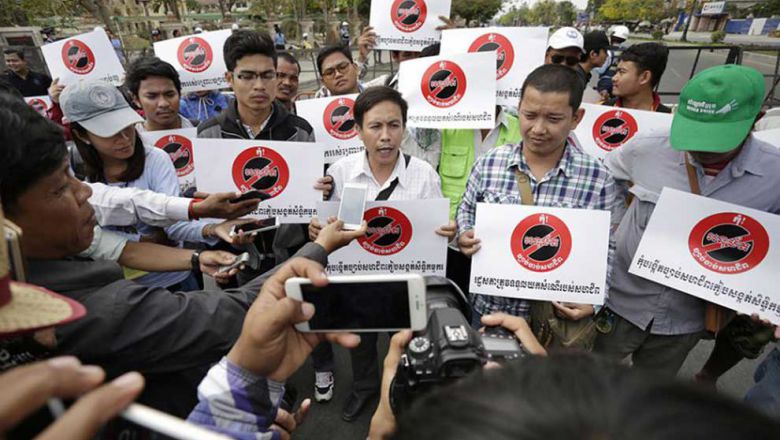Union members speak to the press at a protest against the Trade Union Law in Phnom Penh last year.
Union members speak to the press at a protest against the Trade Union Law in Phnom Penh last year. Hong Menea
Along Phnom Penh’s infamous Veng Sreng Boulevard, 27-year-old garment worker Houn Ean was on strike yesterday for the second week in a row.
“We blocked the road on the first day of the protest, but the authorities threatened to crack down,” said Ean, who has worked at Meng Da Footwear for over a year and has joined hundreds of colleagues in objecting to the company’s lack of payment of their annual leave and severance. “So we decided to protest in front of the factory.”
Despite the fact that there are 16 unions represented among the factory’s 5,000 workers, Ean and her co-workers are leading the strike themselves.
That’s because not one of those unions is allowed to represent the workers due to draconian rules passed in the Trade Union Law last year that are now beginning to have far-ranging impacts, according to union leaders.
“You see the workers going on strike and you see that there is no one to help them,” said Sar Mora, campaign coordinator at Cambodian Food and Service Workers’ Federation (CFSWF). “You want to help them, but you cannot do that, because this is the law.”
With the government in the midst of the harshest crackdown on independent voices in recent memory, labour union leaders in the Kingdom say they are being increasingly harassed, intimidated and barred from organising worker responses to labour rights violations.
Many point to the passage of the widely criticised Trade Union Law last year as a turning point.
“After the Trade Union Law passed, we lack freedom to form unions, we cannot represent members to demand benefits, we face lots of criminal charges and arrests and we have not benefitted,” said Yang Sophorn, president of Cambodia Alliance of Trade Union (CATU).
As a result, worker strikes are increasingly being led by workers themselves, with union leaders choosing to go underground for fear of being tagged by government authorities as instigators.
“When workers protest we cannot show up or stay at the front lines with them,” Sophorn said. “If we do, the authorities will make the excuse that we incited workers to protest.”
At a meeting of labour unions and NGOs on Tuesday to discuss negative impacts of the law, the International Trade Union Confederation’s Monica Wong said nearly 80 independent unions had been blocked from registering with the Labour Ministry and that there had been 25 instances in which officially-appointed union representatives had been arrested since 2015.
“We are in an uncertain situation,” Mora said. “Sometimes we don’t know what to do. What’s right and what’s wrong? We don’t know how long we can keep moving.”
One of the most debilitating rules of the Trade Union Law, which was decried by rights group as unconstitutional when it was passed unanimously by the CPP-controlled government last year, is the requirement that only unions with “most representative status” – at least 50 percent of the workers on the floor, plus one – can represent them in collective bargaining negotiations.
In addition, the Ministry of Labour tacked on additional requirements that have bewildered both workers and union leaders, Mora said, for example requiring three original copies of meeting attendance lists to register a union.
“You can imagine,” Mora said. “You go to a conference and they require you to sign three attendance lists. Hundreds of workers attend these meetings. Why do you need three copies?”
Ministry of Labour spokesman Heng Sour could not be reached yesterday. There is evidence that the law had an almost immediate impact on the ability to seek redress through legal channels.
Cases at the Arbitration Council, the independent body established to help resolve labour disputes, dropped 81 percent this year, from 248 cases last year to 47 as of this month, according to spokeswoman Ann Vireak.
Vireak stopped short of saying exactly why she thought the number fell, but did mention the passage of the Trade Union Law last May.
“What I can say is that starting in September, the disputes coming to the Arbitration Council dropped,” Vireak said.
Now more than one year and a half after the law was passed, garment workers say they are more on their own than ever.
Lim Srey Rath, a worker at the beleaguered Gawon factory in Kandal’s Takhmao town, said union leaders still accompany workers to negotiations but no longer lead strikes.
“They told us if they lead the strike, they can face arrest,” she said. Workers at Gawon have protested three times since October, including yesterday, for pay that they said never materialised.
The company’s manager has repeatedly promised to repay workers after meeting with government officials, but Srey Rath said the money has yet to appear and that some workers have seen factory managers taking machines and other equipment from the factory despite promises that they would sell the assets to pay for workers’ salaries.
“We don’t want to protest because we face arrests, crackdowns, beatings from the authorities and the factory will deduct our daily wage,” Rath said. “But we don’t have an option.”

add me on facebook: https://www.facebook.com/jon.wk.1
Downvoting a post can decrease pending rewards and make it less visible. Common reasons:
Submit